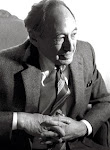
Years of the modern! years of the unperform'd!
Your horizon rises, I see it parting away for more august dramas,
I see not America only, not only Liberty's nation but other nations
preparing,
I see tremendous entrances and exits, new combinations, the solidarity
of races,
I see that force advancing with irresistible power on the world's stage,
(Have the old forces, the old wars, played their parts? are the acts
suitable to them closed?)
I see Freedom, completely arm'd and victorious and very haughty,
with Law on one side and Peace on the other,
A stupendous trio all issuing forth against the idea of caste;
What historic denouements are these we so rapidly approach?
I see men marching and countermarching by swift millions,
I see the frontiers and boundaries of the old aristocracies broken,
I see the landmarks of European kings removed,
I see this day the People beginning their landmarks, (all others give way;)
Never were such sharp questions ask'd as this day,
Never was average man, his soul, more energetic, more like a God,
Lo, how he urges and urges, leaving the masses no rest!
His daring foot is on land and sea everywhere, he colonizes the
Pacific, the archipelagoes,
With the steamship, the electric telegraph, the newspaper, the
wholesale engines of war,
With these and the world-spreading factories he interlinks all
geography, all lands;
What whispers are these O lands, running ahead of you, passing under
the seas?
Are all nations communing? is there going to be but one heart to the globe?
Is humanity forming en-masse? for lo, tyrants tremble, crowns grow dim,
The earth, restive, confronts a new era, perhaps a general divine war,
No one knows what will happen next, such portents fill the days and nights;
Years prophetical! the space ahead as I walk, as I vainly try to
pierce it, is full of phantoms,
Unborn deeds, things soon to be, project their shapes around me,
This incredible rush and heat, this strange ecstatic fever of dreams
O years!
Your dreams O years, how they penetrate through me! (I know not
whether I sleep or wake;)
The perform'd America and Europe grow dim, retiring in shadow behind me,
The unperform'd, more gigantic than ever, advance, advance upon me.
Walt Whitman



